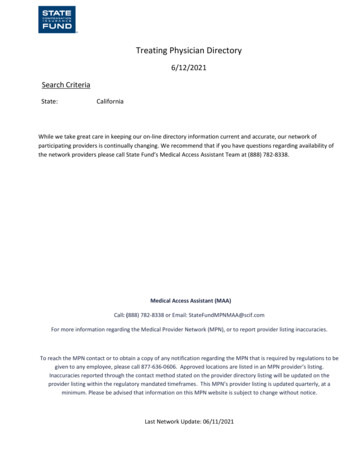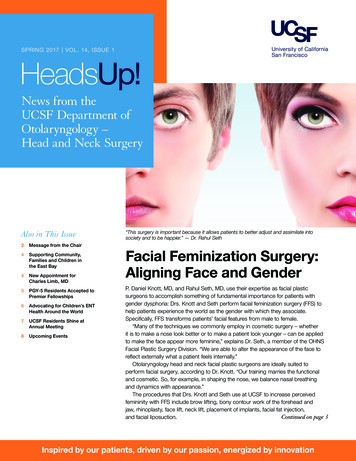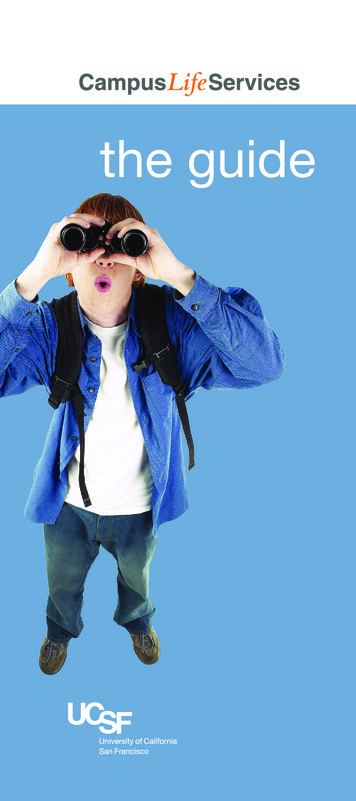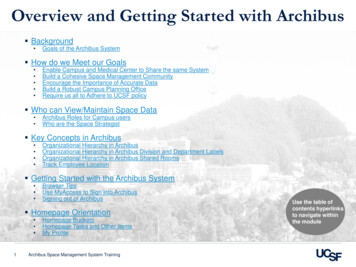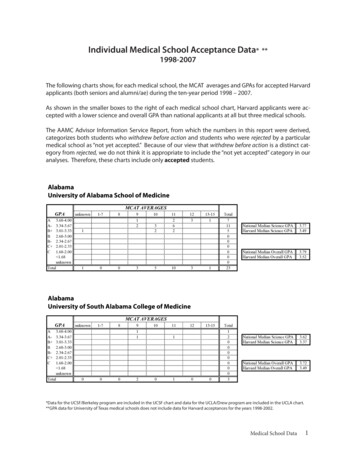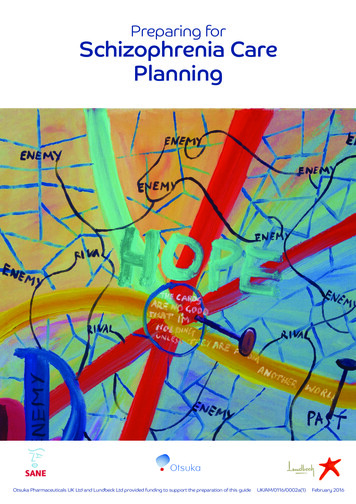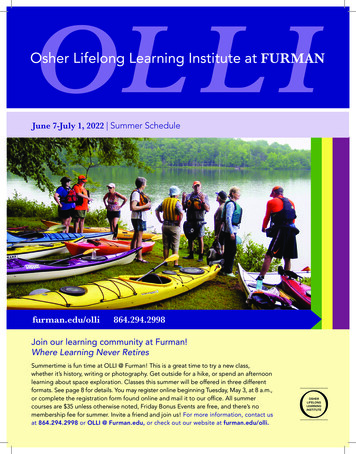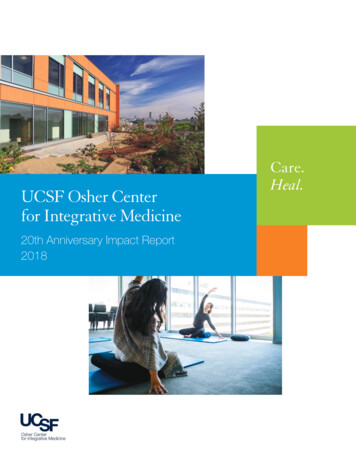
Transcription
UCSF Osher Centerfor Integrative Medicine20th Anniversary Impact Report2018Care.Heal.
Dear Friends,This year we celebrate the 20th anniversary of the founding of the UCSF OsherCenter for Integrative Medicine. Such a significant milestone gives us an opportunityto reflect on all that we’ve accomplished over two decades, consider where we arenow, and envision our next 20 years.We’ve come a long way: In our clinic’s first full year, we had 1,200 patient visits;this past year, we had more than 10,000. We’ve become fully integrated into UCSFHealth; physicians from across the system refer patients to our services. We have arobust research portfolio, including studies of the effectiveness of exercise for posttraumatic stress disorder, non-pharmacologic treatments for postsurgical pain, mindfulness for diabetes, acupuncturefor neuropathy, and much more. And now every UCSF health professions student is required to learn integrativeconcepts through our contributions to UCSF’s interprofessional curriculum.Our growing UCSF Osher Center team comprises compassionate, interdisciplinary clinicians; innovative and devotededucators; creative, committed researchers; expert, dedicated staff members; and brilliant and enthusiastic fellowsand students. Together, we’ve created a warm and welcoming environment that provides a unique combination ofintegrative care, teaching, and study.To mark our 20th year, we recently created new vision, mission, and values statements. Our collaborative processallowed us to articulate our collective purpose in a meaningful way in order to guide our work – why we exist, what westand for, and where we’re going.We also launched a new website this year to serve as a virtual home for the UCSF Osher Center and an easy-toaccess resource on integrative health for everyone.We are grateful to visionaries Bernard and Barbro Osher and to all of you who have given your time, ideas, andresources to help us thrive. We will continue to rely on you as we move forward.Here’s to a wonderful first 20 years of the UCSF Osher Center and many future opportunities to nurture health andinspire well-being.Shelley R. Adler, PhDDirector, UCSF Osher Center for Integrative MedicineOsher Foundation Distinguished Professor of Integrative MedicineProfessor, UCSF Department of Family and Community Medicine
UCSF Osher Center massage therapist Carolyn Tague, MA, CMT, treats a patient in the Osher Center clinic.VisionValuesTo nurture health and inspire well-beingWhole-Person Care: Our comprehensive, team-basedfor all peopleapproach acknowledges all aspects of each individual –body, mind, and spirit.MissionWe are committed to:Providing the highest-quality health care byblending proven conventional and complementarymedicine approaches from around the worldProducing outstanding integrative health leadersthrough transformative education and trainingAdvancing the science of integrative health byconducting and disseminating rigorous researchEquity: We welcome and respect all people, valuediversity, and strive for inclusivity. We are committedto improving integrative health care for members ofmedically underserved communities.Compassion: We foster empathy and attend to theinfluence of social, cultural, and historical contexts onhealth, health behaviors, and access to health care.Collaboration: We promote interprofessional teamworkamong our clinicians, educators, and researchers, andbuild partnerships across UCSF and internationally.Focus on Wellness: We emphasize health promotionand illness prevention, as well as treatment of disease.Empowerment: We provide resources and tools thatcultivate resilience and engage each person’s uniquehealing abilities.3
Decoding Life toImprove HealthHer project, Evaluating Multivariate MRI Maps of BodyAwareness, is funded by the National Institutes of“Health and private philanthropy and is conducted incollaboration with the East Bay Meditation Center inA profound understanding of how to heal someoneOakland, one of the most diverse Buddhist communitiesrequires a deep dive into what makes each personin the United States.unique. Whole-person care, one of our core values,means providing the best, personalized health care forthe body, mind, and spirit to promote wellness, preventillness, and treat disease.increase the diversity of participants in her neurosciencestudies, including people of color, persons withdisabilities, LGBTQI individuals, and other often-Meditation’s Effects on the Body and BrainHelen Weng, PhD,assistant professor inthe UCSF Department ofPsychiatry, studies howmeditation practices mayimprove health. Usingfunctional magneticresonance imaging(fMRI) to scan the brainHelen Weng, PhDDr. Weng also uses community-based methods toand compile data onhow meditation affectsmarginalized segments of the population.Even in the initial stages of development, Dr. Weng’swork received international attention within thecontemplative neurosciences field. In the past few years,she’s been invited to give talks at premier internationalscientific gatherings, including a presentation in 2016to the Dalai Lama at the Conference on Buddhism andScience in Ulaanbaatar, Mongolia. Conference organizerssaid their goal was to inspire young people to pursuesimilar lines of work, and Dr. Weng spoke to youngMongolian women who were excited about her research.“It’s a priority for me to help increase the diversity ofmeasurable factors such as heart rate and brain activity,meditators within neuroscience studies,” she says. “I amDr. Weng is developing new neuroscientific tools topassionate about making the science I do accessible toassess mental states during meditation so we can betterthe public. It is my personal goal to give people the skillsunderstand the mechanisms through which meditationto know their own minds and bodies in order to makemight improve health.healthy decisions for themselves and their communities.”Dr. Weng presents her work at the Conference on Buddhism and Science in 2016 in Mongolia, with the Dalai Lama (third from left)among the attendees.4
Leveraging Discoveryto Revolutionize Careat two sites: UCSF Medical Center at Mission Bay, anacademic medical center where hospital stays often arescheduled ahead of time; and Zuckerberg San FranciscoGeneral Hospital and Trauma Center, a safety-netAs one of the world’s top integrative medicine centershospital where patients are often hospitalized suddenly– and home of the Coordinating Center for the sevenafter an emergency-room visit. When this study is fullyOsher Centers worldwide – the UCSF Osher Centerfunded, participants will be divided into groups thatcontinues to lead the way in pioneering integrativereceive the usual pain medications plus acupuncture,research projects and translating our discoveries intomultifaceted pain counseling, or both.enhanced care for our patients.Shifting the Perception of PainNon-pharmacologicalways of reducing painare desperately needed,Maria Chao, DrPH, MPAHow does paincounseling help?as individuals, health“In pain counseling, we provide educationsystems, and insurersand coping tools. We explain how pain can beseek alternatives toviewed as a whole-body experience, how ouropioids, which are beingemotions are connected. We teach patientsprescribed and misusedskills that can help shift their mindsets, such asat epidemic levels.relaxation techniques and thinking patterns thatWith a grant of morethan 2.7 million fromreframe the pain.”– Maria Chao, DrPH, MPAthe Patient-Centered Outcomes Research Institute,Maria Chao, DrPH, MPA, associate director of researchfor the UCSF Osher Center and associate professor inthe UCSF Department of Medicine, launched a study tounderstand how the stressful experience of a hospitalstay impacts a patient’s pain.“Pain isn’t just physical intensity. It’s deeply connectedto a person’s psychosocial experience,” Dr. Chao says.“If you are depressed, anxious, or under stress, you feelpain more acutely. Medications can reduce the physicalBecause the perception of pain is experienced individually,pain, but we support people’s whole experience, andDr. Chao and her team are gathering a diverse group ofthat has a more meaningful impact.”English-, Spanish-, and Cantonese-speaking participants“When I came to the UCSF Osher Center, I had three goals: Be able to get up froma chair without using my arms, get onto the floor to play with my grandchildren,and dance again. With help from Dr. Mehling, I’ve reached all of those goals. I’velearned to move again without pain. And I can dance my heart out.– Margaret Carlock, patient of Wolf Mehling, MD, at the UCSF Osher Center5
Complementary Cancer Carefor patients with urologicand prostate cancers.Through an integrativeHe spends one day eachoncology collaboration,week embedded in thethe UCSF Osher Centerurologic oncology clinic,for Integrative Medicinewhich is helpful to patientsand the UCSF Helen Diller– especially those comingFamily Comprehensivefrom long distances –Cancer Center mergebecause they can get allconventional cancercare and complementaryAnand Dhruva, MDmethods to supportpatients throughchallenging treatments and recovery.Federal grants combined with 1 million in privatephilanthropy have helped the UCSF Osher Center launchseveral pilot projects that will be carefully evaluated toadd to the evidence base of integrative oncology.“Patients with cancer often want to use complementarymedicine but don’t have practitioners to guide them,”says Anand Dhruva, MD, associate director of educationat the UCSF Osher Center, associate professor in theUCSF Department of Medicine, and one of the projectleads. “We want to provide that expertise and support,Sanjay Reddy, MDof their care in one visit.He also teaches patientsintegrative techniques to use at home, such as guidedimagery – using words and music to evoke positiveimaginary scenarios to bring about a beneficial effect.Dr. Reddy says integrative care referrals are continuallyincreasing throughout UCSF, and he’s happy to have achance to more thoroughly implement acupuncture intoclinical care. “It’s exciting. The timing is right, and thesetting is right to move these things forward,” he says.In June, the UCSF Osher Center co-hosted the firstIntegrative Oncology Symposium for faculty membersand trainees to help continue the momentum of ourpartnership with the Cancer Center.so we’re working together to build a new model of care.”In one of the pilot studies, Dr. Dhruva, a medicaloncologist and specialist in traditional ayurvedicmedicine, is studying how plant-based remedies canreduce side effects during chemotherapy.Oncologist and Osher Center faculty scholar ChloeAtreya, MD, PhD, is assessing group videoconferencesessions to teach mindfulness techniques to cancerpatients, wherever they live.Epidemiologist Erin Van Blarigan, ScD, is creating asmartphone app that provides helpful tools to encouragecancer patients to be physically active and eat healthfullyduring and after treatment.Hospitalist and medical acupuncturist Sanjay Reddy,MD, associate director of clinical programs at the UCSFOsher Center, studies how acupuncture can relieve pain6Helen Ye, MS, LAc, uses acupuncture to treat a patient.
Immersive Training forIntegrative PhysiciansAn important aspect of our mission isto train outstanding integrative healthleaders. While many integrative fellowshipsaround the country rely on distancelearning, our clinical fellowship providesfull-time, hands-on, integrative medicinetraining with close mentorship from UCSFOsher Center clinicians.“We work with our fellows day in andday out, mentoring them during and afterpatient encounters,” says Dr. Dhruva, whoalso directs the UCSF Osher Center’sClinical Fellowship in Integrative Medicineprogram. “These fellowships are one ofthe most important educational programswe offer at the Osher Center. It’s excitingto be training outstanding, up-and-comingleaders in integrative medicine.”In addition to caring for patients, fellowsattend informative weekly seminars andcomplete a scholarly project to advancethe field and give an early boost to theircareers as integrative physician-scientistsor physician-educators.Fellows bring their own interests andspecialties to their time at the UCSFOsher Center. Current fellow Selena Chan,DO, an integrative psychiatrist who usescomplementary techniques to enhanceher patients’ wellness, is developing anew integrative psychiatry curriculum forthe center to train future fellows and otherprofessionals who want to make theirpractices more integrative.UCSF Osher Center massage therapist Marcia Degelman, CMT, caresfor an infant at UCSF Benioff Children’s Hospital San Francisco.Clinical CollaborationsAcross CampusOver the years, the UCSF Osher Center has become moredeeply integrated into UCSF’s clinics and hospitals. In additionto interdisciplinary research studies, we now have numerousclinical partnerships: Blood and Marrow Transplant: massage therapy for patientswith cancer, neurological challenges, and complex chronic pain Cardiology: acupuncture to relieve postsurgical pain Helen Diller Family Comprehensive Cancer Center:numerous clinical collaborations, including acupuncture forinpatients and outpatients (see “Complementary CancerCare,” p. 6) Obstetrics and Gynecology: mindful meditation, massage,and acupuncture Palliative Care: inpatient acupuncture Pediatrics: acupuncture, massage, and nutrition services atUCSF Benioff Children’s Hospitals Women’s HIV Clinic: acupuncture7
Integrative Medicine for Young Patients“As I’ve learned the tenets of integrative medicine andJenifer Matthews, MD,a practicing pediatrician for10 years, had been usinga blend of biomedical andcomplementary medicinewith her own family butwanted to learn to usebeen immersed in the UCSF Osher Center’s approach,I’ve come to believe that this is exactly what I signedup for in becoming a physician – building relationships,giving patient-centered care, serving those most inneed, and using the most appropriate medicine for eachindividual,” Dr. Matthews says. “I’m becoming the kindof physician that I’ve always wanted to be.”integrative techniques– including hypnosis,biofeedback, andacupuncture – withJenifer Matthews, MDher young patients.Last year, Dr. Matthews joined the UCSF Osher Center asits first Pritzker Clinical Faculty Scholar, based at UCSFBenioff Children’s Hospital Oakland. She is mentored byintegrative pediatricians Sanford Newmark, MD, directorof clinical programs at the UCSF Osher Center andprofessor in the UCSF Department of Pediatrics, andDavid Becker, MD, MPH, LMFT, integrative pediatricianand behavior specialist at the UCSF Osher Center andclinical professor in the UCSF Department of Pediatrics.Wolf Mehling, MD, uses hands-on “manual medicine” with a patient.“Many people want other options for their children –less-invasive techniques that don’t use medications,”Dr. Matthews says. “The UCSF Osher Center provideseffective, evidence-based medicine, and by training here, Ican bring new knowledge and skills to what I’m doing.”Throughout the week, she works in the UCSF Divisionof Adolescent and Young Adult Medicine, school-basedclinics, and Dr. Newmark’s autism and ADHD clinics.She also attends weekly seminars and participates inthe new Integrative Medicine Working Group at UCSFBenioff Oakland, which she helped form.“A Partnership toAmplify Our MessageThe Osher Collaborative has formed apartnership with the Journal of Alternative andComplementary Medicine to produce a newquarterly column. Dr. Chao and Dr. Adler pennedthe inaugural article, “Integrative Medicine andthe Imperative for Health Justice.”I’ve had biofeedback as well as manual medicine care at the Osher Center, andthese therapies and mindfulness techniques have helped me in many areas of my life.I wish such services were better integrated into the entire health care system so morepeople could avail themselves of them. – R.G., UCSF Osher Center patient8”
The center has formalized its diversity and inclusiongoals into three overarching categories: Infrastructure: Formalized leadership, such asDr. Chao’s role, plus formation of a working group thatmeets biweekly, help keep diversity and inclusion atthe forefront of hiring, training, research, andpatient care.Dr. Adler leads a Diversity, Equity, and Inclusion meeting for UCSFOsher Center staff.Partnering to AchieveHealth Equity Climate: Evaluating and analyzing data onpatient demographics, gathering input from facultyand staff members on experiences with bias, andholding a day-long diversity and inclusion retreateach year are among the actions that make theUCSF Osher Center a welcoming place for patientsand learners alike. Advancing Health Equity: Partnerships withMany medical settings, including complementary care,public health clinics and community organizationshave had long-standing barriers to access. The UCSFhelp the UCSF Osher Center reach underservedOsher Center pursues creative ways to reach medicallypopulations and ensure that our services are availableunderserved communities, including partnerships withand accessible to everyone.safety-net clinics and community organizations, affordablegroup classes, group medical visits, and a fund thathelps patients pay for care.Fostering Diversity, Equity, and InclusionWe believe that integrative medicine must“I’ve always been interested in public health, andmy hope was to reduce health disparities usingcomplementary medicine,” Dr. Chao says. “Now Ihave my dream job. It’s exciting that the UCSF OsherCenter includes diversity and inclusion as one of itscore values.”compassionately address the needs of all members ofsociety, endorsing the right of all people to access theirhighest attainable health and well-being.“Many people have experienced racism and sexism intheir medical care,” says Dr. Chao, the UCSF OsherCenter’s associate director for health equity and diversity.“We want to ensure that the UCSF Osher Center fostershealth equity and justice and welcomes everyone.”2,000 people per year participate in UCSFOsher Center public-education programs, includingmindfulness-based stress-reduction, mindfulnessbased childbirth and parenting, and yoga.Couples who are soon-to-be new parents attend a mindfulness-basedchildbirth class.9
Osher CenterPatient: Erica ChoyErica Choy says she begins to feel better themoment she steps into the elevator in theOsher Building at UCSF’s Mount Zion campusSanford Newmark, MD, examines a patient in the UCSF OsherCenter clinic.and presses the button for the fourth floor,home to the UCSF Osher Center clinic. Fornearly 13 years, Erica has been treated at theclinic for chronic back pain, receiving massagetherapy, biofeedback, and dietary advice, andlearning mindfulness techniques.Caring for our community includes providing servicesto patients of all ages, regardless of their financialcircumstances. Supported by foundations and privatephilanthropy, the Community Care Fund subsidizes careUCSF Osher Center clinicians have helpedfor patients in need. In fiscal year 2018, the fund assistedprovide relief and given her tools to cope with167 people during 1,352 clinic visits.pain on her own, dramatically reducing herreliance on medications. Her trust in the centeris so deep that she has brought in severalfamily members for care as well. And becauseErica relies on Medi-Cal, the Osher Center’sCommunity Care Fund has been an invaluableresource over the years.“The Osher Center is really invested in helpingme,” she says. “They care for my physicalhealth, but they also care about my emotionalpain. At every visit, I learn something new.”10Closing the Care Gap“We are committed to serving people across theeconomic spectrum,” says Diane Sabin, UCSF OsherCenter clinic administrative director. “This fund helps usprovide on-site care to anyone who needs it. I think of theclinic as the heartbeat of the UCSF Osher Center. All ofus who work here are proud of the high level of serviceswe offer our community.”1,352 clinic visits were funded by theCommunity Care Fund in fiscal year 2018.
Making Your Mind Your AllyThe UCSF OsherCenter’s servicesextend to SanFrancisco’s Tenderloinneighborhood where,“I try to encourage students to have an open mindand just be willing to try,” Fein says. “I tell them thatby training a few minutes each day, their minds canbecome their greatest allies.”2,500 homeless and at-risk youths haveat the nonprofit Larkinbeen served by the Pritzker Mindfulness ProgramStreet Youth Services,for Urban Youth since 2013.young people who arehomeless and haveexperienced traumaForest Fein, MAlearn to meditate as away of feeling somecontrol over their minds and some peace in their lives.Forest Fein, MA, director and lead instructor in the UCSFOsher Center’s Pritzker Mindfulness Program for UrbanYouth, specializes in helping teens and young adults.“Part of my work involves making mindfulness cool,”he says. “Mindfulness has become more mainstreamin recent years, so I can list celebrities, musicians,and athletes who meditate to up their game, be moresuccessful, and be more creative. My students canconnect with that.”Over the past five years, Fein has reached thousandsof homeless and at-risk youths through a seven-weekmindfulness program and follow-up support at LarkinStreet, and retreats at the UCSF Osher Center. Since2016, he also has provided mindfulness training atthree Bay Area locations of Year Up, a nonprofit thatprovides skills training and internships for underservedyoung adults.Thanks to the Lisa and John Pritzker Family Fund(founding sponsor) and the UCSF Mount Zion HealthFund, these services are offered free of charge to peoplevery much in need, many of whom never would haveimagined that meditating could help them.One of Forest Fein’s mindfulness students continues her meditation practice.Photo: Claudine Gossett11
20 Years of UCSF Osher Center Impact1998 The UCSF Osher Center for Integrative2008 Philanthropic support helps the clinical programMedicine established with support from The Bernardexpand to include pediatric patients, and the NCCIHOsher Foundation.awards a rare second Center of Excellence grant tothe UCSF Osher Center.1999 The UCSF Osher Center receives the first ofnumerous prestigious National Institutes of Health2010 The UCSF Osher Center receives a second NCCIHresearch and education grants.education grant to develop an interprofessional curriculumin integrative medicine.2002 Clinical practice opens, with 1,200 patientvisits in the first year – a figure that will grow nearly2011 The new Osher Building – constructed thanks totenfold in the two decades that follow. The Communitya generous gift from Bernard and Barbro Osher – opensCare Fund also is established to provide financialon UCSF’s Mount Zion campus, allowing the UCSFassistance to patients in need.Osher Center to relocate all of its programs, faculty,and staff to a single location, expand services offered to2003 The UCSF Osher Center receives a five-patients, and more closely coordinate patient careyear education grant from the National Center forwith other UCSF clinics.Complementary and Integrative Health (NCCIH) tointegrate complementary medicine into the medical2015 The UCSF School of Medicine’s Bridgesschool curriculum – at a time when adding integrativeCurriculum launches, with substantial contributionsmedicine content to a mainstream curriculum wasfrom the UCSF Osher Center to ensure that thea pioneering concept.university’s medical students learn integrative methodsto benefit their future patients. The UCSF Osher Center2004 The NCCIH gives the UCSF Osher Center aalso welcomes its first clinical fellows in integrativeprestigious Center of Excellence award to investigatemedicine – early-career physicians who train tothe effects of a meditation-based stress-reductionbecome innovative leaders.intervention for patients with HIV.’98’10Barbro Osher, Donald Abrams, MD, the late Tomoye Takahashi,and Bernard Osher at a 2010 gathering12
2017 The Bernard Osher Foundation names theUCSF Osher Center as the host institution forthe Osher Collaborative for Integrative Medicine’scoordinating center and endows the program tofacilitate initiatives among the seven Osher Centersfor Integrative Medicine around the world.The OsherCollaborative forIntegrative Medicine2018 The UCSF Osher Center celebrates 20years of innovation and leadership in integrativemedicine and continues to grow – from pioneeringinterprofessional programs to new clinical caremodels and research across disciplines.2019 and beyond Thanks to our dedicatedfaculty, staff, and learners, as well as generousfriends and donors, the UCSF Osher Center iswell-positioned to serve as a model of health careThe Osher Collaborative comprises aninternational group of seven academic centersfunded by The Bernard Osher Foundation to study,teach, and practice integrative medicine: University of California, San Franciscointegration, a source of best practices for clinicians(host institution)and health systems around the world, and a place Harvard Universitywhere patients can find compassionate, high- Karolinska Institutetquality, integrative care. Northwestern University University of Miami University of Washington Vanderbilt University’11’15Dr. Adler meets with medical students.’18The 2018 Osher Collaborative Meeting washosted by the Osher Center for Integrative Medicineat Karolinska Institutet in Stockholm, Sweden.13
“This is a highly collaborative place.As a staff member, and even asan intern, you feel valued at theUCSF Osher Center – like everycontribution you make can trulymake a difference.– Katrina Cabral, UCSF Osher Centerclinic education coordinator and formerOsher Center internThank YouFor more information about the UCSF Osher Center andhow you can contribute to its mission, contact:Evan KavanaghDirector of DevelopmentUCSF Foundation(415) 514-1137 or (415) 476-6922Evan.Kavanagh@ucsf.eduThank you for all you do for UCSF.14
Clockwise, from top left: Yoga teacher Traci Joy Burleigh assists a participant in therapeutic yoga for cancer patients; a mindfulness-based childbirth and parentingclass; UCSF Osher Center’s original location at 1701 Divisadero Street; a tai chi class; the late Ellen Hughes, MD, PhD, UCSF Osher Center interim director (19982001); UCSF Osher Center’s original waiting room and library; Susan Folkman, PhD, UCSF Osher Center director (2001-2009)15
Photo: Claudine GossettE35110
Decoding Life to Improve Health A profound understanding of how to heal someone requires a deep dive into what makes each person unique. Whole-person care, one of our core values, . mind, and spirit to promote wellness, prevent illness, and treat disease. Meditation's Effects on the Body and Brain Helen Weng, PhD, assistant professor in the .
